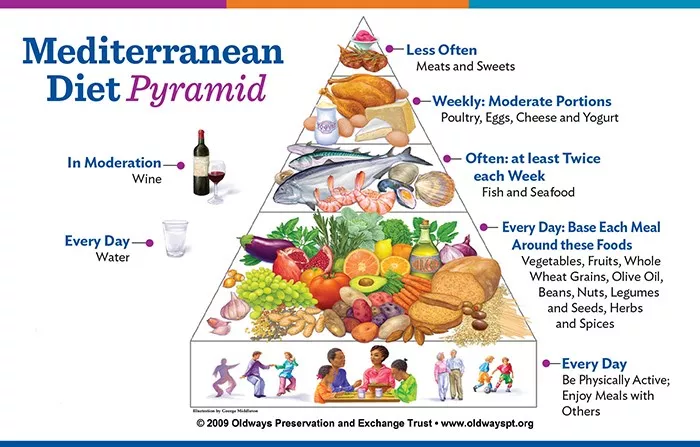Scientists have intensely studied the eating patterns characteristic of the Mediterranean Diet for more than half a century. Out of this extensive work came an understanding that certain Mediterranean–eating patterns were remarkably connected with lifelong good health. November is National Alzheimer’s Awareness Month and research has found that people who exercise and closely follow a Mediterranean Diet, rich in fruits, vegetables, olive oil, legumes, whole grains and fish, seem less likely to develop cognitive decline. Research also supports the use of the Mediterranean diet as a healthy eating pattern for the prevention of cardiovascular diseases, increasing lifespan, and healthy aging. When used in conjunction with caloric restriction, the diet may also support healthy weight loss.
SIMPLE STEPS FOR EATING THE MEDITERRANEAN WAY:
1. Eat lots of vegetables. From a simple plate of sliced fresh tomatoes drizzled with olive oil and crumbled feta cheese to stunning salads, garlicky greens, fragrant soups and stews, healthy pizzas, or oven-roasted medleys. Choose a variety of vegetables such as carrots, beets, eggplant, kale, squash, and tomatoes. Vegetables are vitally important to the fresh tastes and delicious flavors of the Mediterranean Diet.
2. Change the way you think about meat. Choose lean poultry, meat, and eggs. Eat poultry like chicken and turkey more often than red meat. If you eat red meat, have smaller amounts – small strips of sirloin in a vegetable sauté or a dish of pasta garnished with diced prosciutto.
3. Enjoy some dairy products. Eat Greek or plain yogurt and try smaller amounts of a variety of cheeses. Choose lower fat milk, yogurt, and cheese.
4. Eat seafood twice a week. Fish such as tuna, herring, salmon, and sardines are rich in omega-3 fatty acids. Shellfish including mussels, oysters, and clams have similar benefits for brain and heart health.
5. Cook a vegetarian meal one night a week. Build meals around lentils, whole grains, and vegetables, and heighten the flavor with fragrant herbs and spices. Down the road, try eating vegetarian two nights per week.
6. Use good fats. Include sources of healthy fats in daily meals, especially extra-virgin olive oil, nuts, peanuts, sunflower seeds, olives, and avocados.
7. Switch to whole grains. Whole grains are naturally rich in many important nutrients. Their fuller, nuttier taste and extra fiber keep you satisfied for hours. Cook traditional Mediterranean grains like bulgur, barley, farro and brown, black or red rice. Choose products made with whole grain flour.
8. For dessert, eat fresh fruit. Choose from a wide range of delicious fresh fruits — from oranges to pomegranates, grapes and apples. Instead of daily ice cream or cookies, save sweets for a special treat or celebration.
Would you like assistance on how to incorporate the Mediterranean Diet guidelines into your meals or to speak with a dietitian further? Please contact Kim Leonard East Area YMCA Health and Wellness Director at 315-637-2025 X220 or kleonard@ymcacny.org to meet with me, Traci McIntosh, MA, RD the YMCA Dietitian!
Enjoy eating the Mediterranean way! Traci McIntosh, MA, RD
